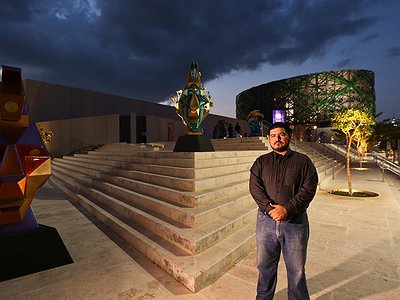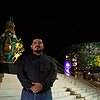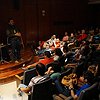Part 2
How would you describe your role in the creative process?
Curating an improvised music festival or concert series is obviously a very complex issue and requires its own set of rules, which you must nevertheless be ready to abandon at any given time (just as an improviser). I have always felt that, in improvised music, the mere action of forming a lineup or choosing the members of an ad-hoc ensemble is almost equivalent to writing an arrangement and handing it to the musicians. In the first years of Cha’ak’ab Paaxil, we only focused on new ensembles and combinations, and when an established band played at our fest (like the Gonzalez family trio Yells at Eels, or Chesterfield, the great Castello/Stangl duo), we always paired them with musicians they hadn’t played with (like Remi Alvarez with Yells at Eels, or Mario de Vega and Chris Cogburn with Chesterfield). But that philosophy changed in our third year, when I programmed for the first time the same pairing from a previous festival (the amazing duo of Remi Alvarez and drummer Milo Tamez, who had debuted as a band in our second fest in 2009). What they played then was more or less a continuation of what they had played the year before; it felt very natural and it was the one of the most acclaimed sets that year. So I’ve bent the rule even more after that, like when nmperign played in our sixth year two very different but equally successful sets with two of their most frequent collaborators, Sean Meehan and Jason Lescalleet. Of course, this is not to imply that I’m the sole programmer, as I often receive curatorial suggestions from musicians (that I mostly accept), and all of my own proposals are obviously approved by the musicians (even my last-minute ideas) or otherwise discarded.
Tell me a bit about your perspective on the selection process for your programming, please. In how far do PR companies, the media and public awareness of an artist or band play a role in programming them? How much room is there in your work for taking creative risks?
PR companies and the media play almost no role whatsoever in our selection process for the festival. Public awareness of an artist is an interesting thing for us, since it’s something that can be used to our advantage (for instance, when one artist has a bigger public profile than others and helps to bring attention to the other artists’ work). Our selection process is solely based on the quality criteria mentioned above (our Kafka axiom), and bound by our budget constraints as a mostly non-funded festival, but I think there’s still plenty of room for creative risks within the aesthetic boundaries of our festival (only featuring non-commercial, non-safe music), especially given how much we like to pair visiting international performers with local, out-of-the-radar musicians. For instance, in our upcoming joint edition with MultipleTap, we’re the only country so far in MT’s international schedule where the Japanese musicians will improvise onstage with the local musicians, besides being a showcase for solo and ensemble sets for Japanese musicians.
It has often been mentioned that "the future of music is in live". What's your perspective on this? What kind of unique experiences does a concert experience continue to offer to this day?
There are many unique experiences that a concert offers that are invaluable these days. Not just disconnecting yourself from your routines and listening to music with your whole body, but also social benefits, like the chance of meeting like-minded people who share some of your interests, the chance for musicians to meet other musicians and form new projects or develop new ideas: in short, the chance to create or join a community, a real physical community, not its ersatz virtual imitations. Before Facebook and Twitter took over most of the online discussions on music and most other topics, some people naively believed that online forums could replace actual physical communities, and we’ve all seen this has not been the case (and probably never will), as the activity and energy of most online forums has dwindled severely and may never recover (to the benefit of Mr. Zuckerberg, et al). So, in terms of creating and maintaining local music scenes – without which there would not be any global experimental music scene to speak of – there’s still nothing like the live concert experience (hopefully with its online or printed counterpart(s) where people criticize, report, or give feedback, and physical or net labels documenting and promoting the music well, etc.).
Can festivals or concert spaces survive just by presenting music these days? What's your take on extra-musical concepts like presentations, discussions, art exhibitions and the like as an enrichment of your musical program?
In our case, non performance-related activities like lectures, workshops, and discussions have been an integral part of our festival since its creation. They definitely enrich the program of activities of any event, but its main benefit is strengthening the local music communities, and also fostering the survival of those communities by creating new audiences. For instance, we have always paid a close interest to workshops with small children, and we have been fortunate to have the help of people like Juan Garcia and Aimee Theriot and their No.Estacion.Arte organization, focused on experimental music education for children. Another person who has influenced us a lot in terms of working with children is trombonist David Dove, who runs the Nameless Sound organization in Houston, TX, and is one of the great experts in the topic within our global experimental music scene. We’ve had circuit-bending workshops for Mayan children in rural communities (taught by Vic Rawlings), creative music workshops for children with cerebral palsy (taught by the great Anla Courtis), didactic concerts for children by saxophonist Alejandro Folgarolas or drummer Milo Tamez, etc. And of course we also have workshops and discussions geared for (young and adult) musicians and non-musicians, and one of their main perks, besides the technical/musical knowledge being shared, is being able to talk and discuss improvised music concepts in a safe, bully-free environment, something that does not occur as often as it should.








